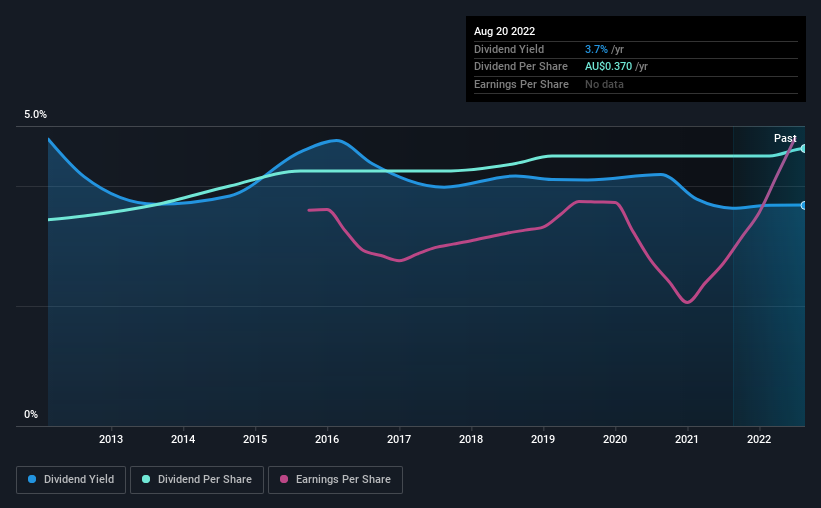- Australia
- /
- Capital Markets
- /
- ASX:AUI
Australian United Investment's (ASX:AUI) Upcoming Dividend Will Be Larger Than Last Year's

The board of Australian United Investment Company Limited (ASX:AUI) has announced that it will be paying its dividend of A$0.20 on the 9th of September, an increased payment from last year's comparable dividend. The payment will take the dividend yield to 3.7%, which is in line with the average for the industry.
Check out our latest analysis for Australian United Investment
Australian United Investment's Earnings Easily Cover The Distributions
Unless the payments are sustainable, the dividend yield doesn't mean too much. The last dividend was quite comfortably covered by Australian United Investment's earnings, but it was a bit tighter on the cash flow front. The business is earning enough to make the dividend feasible, but the cash payout ratio of 88% indicates it is more focused on returning cash to shareholders than growing the business.
Looking forward, earnings per share could rise by 10.0% over the next year if the trend from the last few years continues. If the dividend continues on this path, the payout ratio could be 59% by next year, which we think can be pretty sustainable going forward.

Australian United Investment Has A Solid Track Record
The company has an extended history of paying stable dividends. Since 2012, the annual payment back then was A$0.275, compared to the most recent full-year payment of A$0.37. This implies that the company grew its distributions at a yearly rate of about 3.0% over that duration. Although we can't deny that the dividend has been remarkably stable in the past, the growth has been pretty muted.
The Dividend Has Growth Potential
Investors who have held shares in the company for the past few years will be happy with the dividend income they have received. Australian United Investment has seen EPS rising for the last five years, at 10.0% per annum. Earnings are on the uptrend, and it is only paying a small portion of those earnings to shareholders.
Our Thoughts On Australian United Investment's Dividend
Overall, it's great to see the dividend being raised and that it is still in a sustainable range. The payments look okay by most measures, the lack of cash flow could definitely cause problems for them in the future. This looks like it could be a good dividend stock going forward, but we would note that the payout ratio has been at higher levels in the past so it could happen again.
It's important to note that companies having a consistent dividend policy will generate greater investor confidence than those having an erratic one. At the same time, there are other factors our readers should be conscious of before pouring capital into a stock. See if management have their own wealth at stake, by checking insider shareholdings in Australian United Investment stock. Looking for more high-yielding dividend ideas? Try our collection of strong dividend payers.
If you're looking to trade Australian United Investment, open an account with the lowest-cost platform trusted by professionals, Interactive Brokers.
With clients in over 200 countries and territories, and access to 160 markets, IBKR lets you trade stocks, options, futures, forex, bonds and funds from a single integrated account.
Enjoy no hidden fees, no account minimums, and FX conversion rates as low as 0.03%, far better than what most brokers offer.
Sponsored ContentNew: Manage All Your Stock Portfolios in One Place
We've created the ultimate portfolio companion for stock investors, and it's free.
• Connect an unlimited number of Portfolios and see your total in one currency
• Be alerted to new Warning Signs or Risks via email or mobile
• Track the Fair Value of your stocks
Have feedback on this article? Concerned about the content? Get in touch with us directly. Alternatively, email editorial-team (at) simplywallst.com.
This article by Simply Wall St is general in nature. We provide commentary based on historical data and analyst forecasts only using an unbiased methodology and our articles are not intended to be financial advice. It does not constitute a recommendation to buy or sell any stock, and does not take account of your objectives, or your financial situation. We aim to bring you long-term focused analysis driven by fundamental data. Note that our analysis may not factor in the latest price-sensitive company announcements or qualitative material. Simply Wall St has no position in any stocks mentioned.
About ASX:AUI
Adequate balance sheet average dividend payer.
Market Insights
Community Narratives




